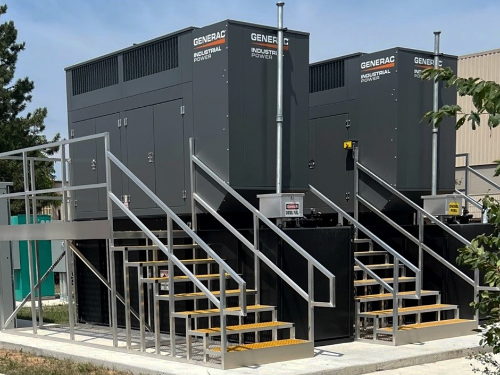Click to Get Big Benefits

What Are Emergency Standby Generators?
Emergency standby generators are devices designed to automatically provide backup power when there is a loss of electrical supply. Unlike portable generators that require manual setup, standby generators are permanently installed and automatically kick in when they detect a power outage. These generators are typically fueled by natural gas or propane, making them a convenient and reliable option for maintaining power during an emergency.
Why You Need an Emergency Standby Generator
Power outages can occur at any time, and the consequences of being without power for extended periods can be severe, especially in areas with harsh climates. Whether it’s a winter storm or a summer heatwave, emergency standby generators ensure that you won’t be left in the dark. Here are a few reasons why having one is essential:
Maintain Essential Functions: An emergency standby generator ensures that your critical systems, such as heating and cooling, medical equipment, security systems, and refrigeration, continue to operate when the power goes out. This is particularly important for those who rely on life-saving devices or have perishable items that require refrigeration.
Peace of Mind: Knowing that you have a reliable source of backup power gives you peace of mind, especially during severe weather or other unpredictable events. Emergency standby generators ensure that your home or business will remain functional, regardless of external conditions.
Automatic Operation: One of the main benefits of emergency standby generators is their automatic operation. Unlike portable generators that require manual setup and monitoring, standby generators sense when there is a power failure and automatically start running. This hands-off feature makes them incredibly convenient, ensuring power is restored immediately without requiring any intervention.
Increased Property Value: Installing an emergency standby generator can increase the value of your property, especially in areas prone to power outages. Homebuyers and business owners often prioritize homes and commercial properties with backup power solutions, knowing that it will save them hassle and frustration during emergencies.
How Emergency Standby Generators Work
When a power outage occurs, emergency standby generators work by automatically detecting the loss of power and starting up within seconds. They transfer the electrical load to the generator, powering critical systems and appliances until utility power is restored. The process is seamless, and there is typically no interruption in the power supply.
These generators are connected to your home or business’s electrical system via a transfer switch. The switch ensures that power is only supplied to the essential circuits you want to keep running, such as lights, heating systems, refrigerators, and medical devices.
Types of Emergency Standby Generators
There are several types of emergency standby generators available, each suited to different needs:
Whole-House Generators: These are larger units designed to power your entire home during an outage. Whole-house generators are ideal for those who want to maintain normal operations in all areas of their home, including heating, air conditioning, and appliances.
Partial-House Generators: Smaller than whole-house models, these generators are designed to power a limited number of circuits, typically covering essential systems like refrigeration, lighting, and heating. Partial-house generators are a more affordable option for homeowners who don’t need to power the entire house.
Commercial Generators: Businesses can also benefit from emergency standby generators, particularly those in industries where downtime can result in significant losses. Commercial generators are larger and more robust, designed to keep essential operations running smoothly, including equipment, lighting, and security systems.
Portable Generators: While not technically “standby” generators, portable generators can be used as a temporary solution for backup power. However, they require manual operation and are less reliable for long-term use compared to permanently installed standby generators.
Choosing the Right Emergency Standby Generator
When selecting an emergency standby generator, it's important to assess your power needs. Consider the following factors:
Power Output: The generator should provide enough wattage to power the essential systems in your home or business. A professional assessment can help you determine the appropriate generator size based on your energy needs.
Fuel Type: Most emergency standby generators run on natural gas or propane. Consider the availability of fuel in your area and the cost of ongoing fuel consumption when choosing a generator.
Installation: Standby generators require professional installation, including the setup of a transfer switch and wiring to your electrical system. It’s essential to hire a licensed electrician to ensure the installation is done correctly and safely.
Maintenance: Regular maintenance is important to keep your generator in good working order. Look for a generator that offers easy maintenance options, such as automatic oil changes and regular service intervals.
Conclusion: Investing in Emergency Standby Generators
In conclusion, emergency standby generators are a crucial investment for ensuring uninterrupted power supply during emergencies. Whether you are protecting your home, your business, or your essential systems, a standby generator provides a reliable and automatic solution to power outages. With the right generator, you can rest assured that you’ll always have the backup power you need, no matter what.

All News
Others
- Terms of use Terms of use
- Contact Us Contact Us
- Privacy Policy Privacy Policy


